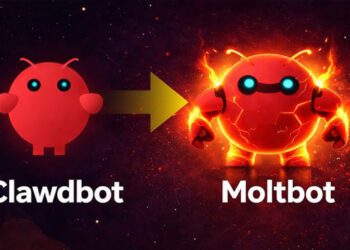
Cognition AI just zoomed past the typical startup trajectory. The company, responsible for an AI coding companion known as “Devin,” has achieved a valuation that some entrepreneurs can only dream about. It’s a staggering figure: $4 billion. That’s right. Four. Billion. Dollars. Even investors accustomed to sky-high valuations are raising eyebrows.
Yet Cognition AI shows no signs of slowing down. They seem to thrive in the spotlight, with tech enthusiasts heralding them as pioneers in the fast-paced world of AI-assisted coding. So, how did this relatively small team rocket to such heady heights? Let’s dissect their remarkable journey.
The Players Behind the Scenes
The name “Cognition AI” might sound futuristic, but the people behind it are firmly rooted in the present. Many of their developers hail from top tech institutions. They’re seasoned engineers who’ve been around cutting-edge neural networks and machine learning since before AI became a household term.
Observers believe this unique pedigree made Cognition AI stand out to investors. It’s not every day you find a team that marries ambition and technical finesse so seamlessly. The startup’s founders built their credibility by dabbling in complex AI research early on, perfecting prototypes well before mainstream industries fully embraced generative models.
And then came Devin—a coding companion that seems to read your programming mind. The synergy is obvious. Deep expertise plus a product that solves real-world coding challenges equals unstoppable momentum.
Devin: A Glimpse of the Future
Let’s say you’re integrating a complex API into your project. Devin not only anticipates your next steps, but it can also reorganize your approach if it detects inefficiencies. It’s meant to reduce the grunt work, freeing coders to focus on creative logic and design choices.
According to early testers, Devin’s advantage lies in its ability to pivot seamlessly between different programming languages and frameworks. One moment, it assists with a front-end JavaScript snippet. The next, it’s proposing a back-end solution in Python, complete with annotated logic. This fluid adaptability has turned heads across the programming world, igniting a cascade of positive buzz.
The $4 Billion Funding Round: What Sparked It?
News about Cognition AI’s most recent funding round spread like wildfire. Joe Lonsdale’s firm took center stage in leading the investment, a crucial piece of the puzzle. Lonsdale isn’t new to technology-driven ventures—he’s well-known for spotting opportunities that reshape entire industries.
So what drew him in? Sources say it’s a combination of market timing, robust AI technology, and a leadership team known for swift innovation cycles. The potential for Devin to become essential across all levels of software development is obvious. Investors saw it. The tech press picked it up. Suddenly, Cognition AI was no longer just a plucky startup. It was a billion-dollar phenomenon with serious backing.
Some wonder: Is it too much, too soon? Skeptics claim the AI coding sector is already oversaturated. But supporters argue that Cognition AI’s unique twist—real-time, context-aware code collaboration—sets it apart. In a landscape brimming with rudimentary autocomplete tools, Devin aims to be an actual partner in coding, not just a helpful parrot.
A Peek Into the Team’s Culture

Culture matters. Especially in the hyper-competitive AI industry, where every advantage counts. By all accounts, Cognition AI fosters a workplace that’s as relaxed as it is relentless. Beanbag chairs may be cliché, but it’s rumored they’re everywhere. People scribble code on glass walls. Brainstorm sessions run until midnight. Pizza boxes occasionally pile up in corners.
But behind the playful veneer, there’s a serious intensity. Team members are said to challenge each other’s ideas. Constructive criticism is considered vital. One senior developer once joked that writing code for Devin feels like “playing 3D chess while juggling.” Yet they do it with a grin. Why? Because they believe they’re creating a tool that could fundamentally change coding forever.
The result? Rapid iteration. Immediate feedback. An environment that says, “Take the risk—just do it wisely.” That’s how major breakthroughs happen.
Market Response and Competitor Tensions
The tech universe, ever watchful, took quick note of Cognition AI’s surge. Giants in the software development space already offer AI-based tools for code completion. Some are built right into popular IDEs. Others rely on open-source models that promise a wide range of capabilities.
Yet the $4 billion valuation shattered illusions that the market was already crowded. Investors see a bright future for advanced coding assistants, and they’re willing to bet big. Competitors are reacting, too. Some are redoubling efforts to refine their own AI. Others are adopting a “wait and see” approach, perhaps hoping that the hype around Devin will level off.
But hype can be justified when users start chanting about the product’s performance. If developers find it faster, more intuitive, and more reliable than alternatives, they’ll flock to Cognition AI. The coding world rewards tools that reduce friction. That’s exactly what Devin strives to do.
The Hiring Frenzy
Flush with new funds, Cognition AI is rumbling through the job market like a freight train. Skilled AI researchers, data scientists, and software engineers are at the top of their wishlist. Adding more top-tier talent is crucial if they want to scale effectively.
The best minds in AI can choose where to work. Many prefer dynamic startups that offer a chance at meaningful innovation, rather than massive organizations where bureaucracy can slow progress. Enter Cognition AI with a fresh war chest, a buzzy brand, and a mission that resonates. For many engineers, that’s a compelling trifecta.
Will they find enough qualified applicants to sustain their rapid expansion? The AI talent pool is deep, but the demand is astronomical. Competition is fierce, especially as other companies scramble to build or maintain their own advanced AI labs. Still, Cognition AI’s recent successes give them a strong edge.
Potential Impact on Coding
Imagine a world where writing code feels like having a highly skilled partner who never tires. Devin, if it keeps evolving, could slingshot software creation into a new era. Some see it as the “calculator” for coding. Humans define the problems, add the creative spin, and supervise the process. The AI offers instant proposals and code blocks, slashing development cycles.
However, some developers fret that such powerful AI might eliminate their roles. Cognition AI executives stress that Devin’s purpose is augmentation, not replacement. They compare coders to architects, and Devin to a supercharged assistant that handles menial tasks.
Whether you view it as a gateway to unstoppable efficiency or a threat to the workforce, it’s hard to deny the shift that’s underway. AI is here. And with each milestone, that presence expands.
Industry Buzz and Media Spotlight
Social media went into overdrive as soon as Cognition AI’s $4 billion valuation was confirmed. Experts debated whether the figure was sustainable. Enthusiasts shared articles, fueling excitement across tech forums.
Major conferences immediately extended invitations, hoping to showcase Devin in marquee demos. This kind of attention can be a double-edged sword. On one hand, it’s great for brand recognition. On the other, it increases scrutiny. Every glitch or security lapse will be magnified.
But so far, Cognition AI has handled the glare with relative ease. They’ve been transparent about upcoming features, open to user feedback, and quick to address potential vulnerabilities. In an industry where big promises often lead to big letdowns, they’re carefully balancing ambition with accountability.
Skepticism and Security Concerns

Not everyone is cheering. Some critics wonder if these AI-coded tools, including Devin, could produce vulnerabilities or malicious scripts. After all, if an AI can build legitimate solutions, it might also generate harmful code in the wrong hands.
Others question data privacy. How does Cognition AI handle proprietary code, especially if it’s processed in a cloud environment? The startup insists they have robust encryption, enterprise-level security features, and the option for local hosting. But critics remain cautious. Technology evolves fast. Security threats evolve even faster.
It’s a valid conversation. The same efficiency that makes AI coding assistants so alluring could become a double-edged sword if exploited by cybercriminals. Cognition AI acknowledges these challenges. They’re working on best practices, but the broader question of AI ethics looms large.
A Wider AI Revolution
Cognition AI’s story isn’t happening in isolation. It’s part of a massive wave of AI-driven transformations. We see it in self-driving cars, voice assistants, healthcare diagnostics—you name it. Now, coding tools are catching up, bridging the gap between machine efficiency and human creativity.
In many ways, Devin is just the tip of the iceberg. If AI becomes adept at writing robust software, it might soon handle bug hunts, test coverage, and even architectural decisions. That doesn’t mean humans vanish from the process. It does mean that tedious steps could be offloaded to these machine collaborators.
Imagine small businesses or indie developers harnessing Devin’s power. They could build sophisticated platforms without needing large teams. Innovation might flourish at a breathtaking pace. Barriers to entry shrink when top-tier coding expertise becomes more accessible.
The Road from Here
So, what’s next for Cognition AI? This is where crystal balls and tech analysis merge. Some analysts predict expansions into industries like finance, where complex code often intersects with huge data sets. Others say they’ll keep refining Devin to carve out an unassailable niche in the developer community.
Partnerships might also be in the cards. Perhaps we’ll see deeper integrations into popular project management tools or direct hooks into version control systems. Big tech players could strike deals to bundle Devin with their platforms, broadening Cognition AI’s global reach.
One thing is certain: They’re not going to rest on their laurels. The $4 billion figure may be a giant milestone, but it’s not the finish line. It’s more like the starting gun. Cognition AI must keep impressing the developer community and satisfying investors who expect a return on their confidence.
From Unicorn to Titan?
Achieving unicorn status (a $1 billion valuation) is a dream for many startups. Cognition AI has quadrupled that. Now they must manage the intense expectations that come with such a towering valuatio
Failure to innovate could be fatal in a space this competitive. One buggy update or controversial security breach might derail progress. Conversely, a steady stream of positive developments could solidify Cognition AI’s standing for years to come.
The company’s leadership appears aware of the stakes. They’re hiring aggressively, engaging the community, and steering the narrative. They’re not shy about their ambition to reshape coding. Yet they also caution that the transformation will be gradual, guided by feedback, and aligned with developer needs.
The Developer Community Reacts
Real-world coders have mixed feelings. Some are elated. They see the day-to-day potential of working alongside an AI partner that zips through mundane tasks. Others remain skeptical. They worry that relying too much on AI might dull crucial problem-solving skills or create complacency among junior developers.
Forums are buzzing with experiments. People share code snippets, test Devin’s adaptability, and brainstorm ways to push its limits. Early reviews are largely positive, praising the tool’s capacity to propose novel solutions and clarify tricky concepts.
Could this be the dawn of a new coding paradigm? For many, it already feels that way. The unstoppable momentum behind AI suggests that developer workflows won’t remain unchanged for long.
Conclusion and the Path Ahead
Cognition AI stands at the intersection of ambition and technology, armed with a revolutionary product and a $4 billion valuation that has rattled the entire AI coding landscape. The path forward is both thrilling and uncertain. Will Devin ignite a true revolution in how software gets built, or is the hype overshadowing practical reality
Most indicators point to genuine innovation. Devin’s real-time context awareness, the team’s deep AI expertise, and the fresh wave of financing all hint at lasting impact. Yes, challenges loom—security, ethics, and competition among them. But if Cognition AI navigates these waters wisely, we might witness a paradigm shift.
The story has just begun. Tune in to see where the next chapter leads, because it’s bound to be compelling. If you’re a developer, you might be writing your next big project with the help of Devin. If you’re an AI enthusiast, keep a close eye on how Cognition AI molds the future. One thing is certain: The wheels are already in motion.








